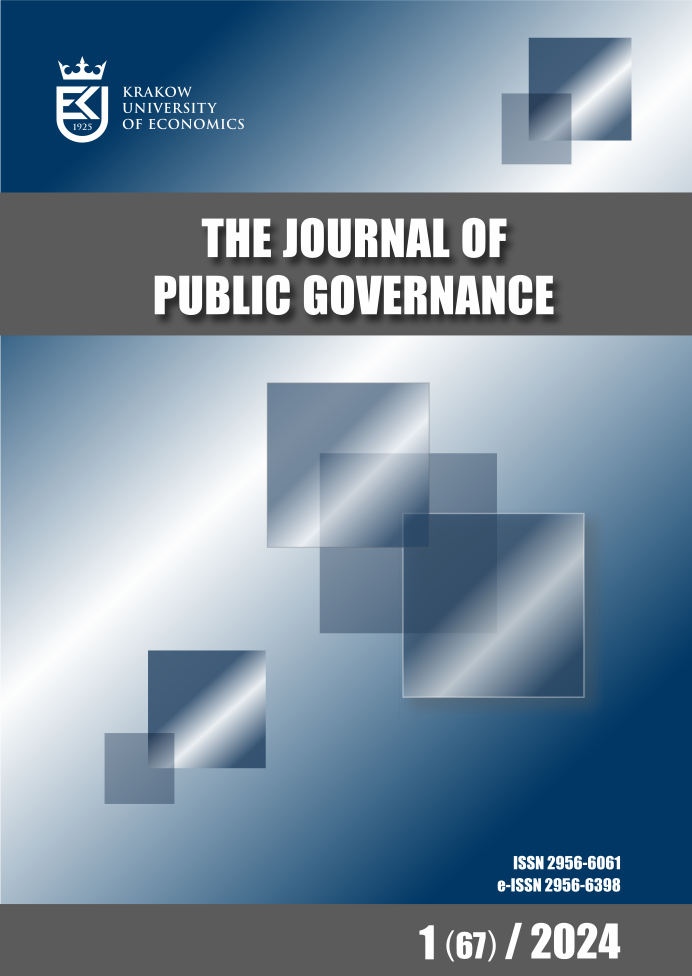Stakeholder Analysis in the Context of Healthcare Entity Managers’ Activities in a Crisis Situation: A Case Study
DOI:
https://doi.org/10.15678/ZP.2020.53.3.03Keywords:
crisis situation, stakeholder analysis, hospitalAbstract
Objectives: The aim of the article is to present the role of the public manager in crisis management based on the analysis of stakeholders of a selected hospital.
Research Design & Methods: Based on the adopted research methodology, an analysis of stakeholders in a selected health care unit was performed. The study used a hospital stakeholder analysis methodology in the context of managing an emergency resulting from the coronavirus pandemic.
Findings: The need for a flexible approach on the part of the public manager requires a proper identification of the interests of stakeholder groups as well as the establishment of good communication. In a crisis situation, this approach is particularly important.
Implications / Recommendations: On this basis, recommendations were formulated with regard to both theoretical and practical aspects of the research problem. The role of hospital stakeholders in managing a crisis situation is indicated.
Contribution / Value Added: Managing a crisis situation in the context of the coronavirus pandemic is a significant
challenge for managers of health care units. In the future, the presented research area can be continued, among other retrospective studies.
Downloads
References
Baruk, J. (2005). Co pobudza przedsiębiorstwa do wdrażania innowacji? Przegląd Organizacji, 7–8, 21–25.
Béland, D., & Cox, R. H. (2016). Ideas as coalition magnets: Coalition building, policy entrepreneurs, and power relations. Journal of European Public Policy, 23(3), 428–445.
Boyett, I. (1996). The public sector entrepreneur: A definition. International Journal of Public Sector Management, 9(2), 36–51.
Canel, M. J., & Luoma-aho, V. (2018). Public sector communication: Closing gaps between citizens and public organizations. John Wiley & Sons.
Chodyński, A. (2016). Interesariusze w kształtowaniu bezpieczeństwa organizacji wobec kryzysu pozaekonomicznego. Bezpieczeństwo. Teoria i Praktyka, 15(4), 41–56.
Cornwall, J., & Perlman, B. (1990). Organizational Entrepreneurship. Boston-Irvin.
Ćwiklicki, M. (2011). Analiza interesariuszy w koncepcji relacji złożonych procesów reakcji. Zeszyty Naukowe/Uniwersytet Ekonomiczny w Poznaniu, 199, 72–80.
Fernandez, S., & Rainey, H. G. (2006). Managing successful organizational change in the public sector. Public Administration Review, 66(2), 168–176.
Fountain, J. E. (2001). Paradoxes of public sector customer service. Governance, 14(1), 55–73.
Frączkiewicz-Wronka, A., & Austen-Tynda, A. (2009). Przywództwo w ochronie zdrowia. Idee i instrumenty. Wolters Kluwer Polska.
Jasiński, A. (2006). Zarządzanie innowacjami – aspekty teoretyczne. Przegląd Organizacji, 11, 11–12.
Kapucu, N., & Ustun, Y. (2018). Collaborative crisis management and leadership in the public sector. International Journal of Public Administration, 41(7), 548–561.
Kisilowski, M. (2009). Zarządzanie kryzysowe w zarządzaniu publicznym. Wydawnictwo Politechniki Warszawskiej.
Kożuch, B. (2004). Zarządzanie publiczne w teorii i praktyce polskich przedsiębiorstw. Agencja wydawnicza Placet.
Kraśnicka, T. (2002). Koncepcja rozwoju przedsiębiorczości ekonomicznej i pozaekonomicznej. Akademia Ekonomiczna w Katowicach.
Lane, J. E. (2000). The public sector: Concepts, models and approaches. SAGE.
Laukka, E., Huhtakangas, M., Heponiemi, T., & Kanste, O. (2020). Identifying the roles of healthcare leaders in HIT Implementation: A scoping review of the quantitative and qualitative evidence. International Journal of Environmental Research and Public Health, 17(8), 2865.
Linden, R. M. (2003). Working across boundaries: Making collaboration work in government and nonprofit organizations. John Wiley & Sons.
Mack, W. R., Greek, D., & Vedlitz, A. (2008). Innovation and Implementation in the Public Sector: An Examination
of Public Entrepreneurship. Review of Policy Research, 25(3), 233–252.
Manuszak, M. (2019). Profile kompetencyjne menedżerów sektora publicznego. Studia i Prace Kolegium Zarządzania i Finansów/Szkoła Główna Handlowa, 172, 123–141.
Olafsen, A. H., Nilsen, E. R., Smedsrud, S., & Kamaric, D. (2020). Sustainable development through commitment to organizational change: The implications of organizational culture and individual readiness for change. Journal of Workplace Learning. DOI: https://doi.org/10.1108/JWL-05-2020-0093.
Ramamurti, R. (1986). Public entrepreneurs: Who they are and how they operate. California Management Review, 28(3), 142–158.
Religioni, U., Czerw, A., Walewska-Zielecka, B., & Augustynowicz, A. (2014). Obszary zarządzania placówką medyczną w sytuacji wystąpienia pandemii grypy. Journal of Health Sciences, 4(9), 181–190.
Schomaker, R. M., & Bauer, M. W. (2020). What Drives Successful Administrative Performance during Crises? Lessons from Refugee Migration and the Covid-19 Pandemic. Public administration Review, 80(5), 845–850.
Strzemecki, P. (2015). Strategie organizacji w sytuacji kryzysowej. Nauki Ekonomiczne, 22, 27–34.
Szczupaczyński, J. (2016). Między polityką a etyką. Nowe role menedżera publicznego w koncepcjach współzarządzania. Studia Politologiczne, 42, 307–323.
Trachsler, T., & Jong, W. (2020). Crisis management in times of COVID‐19: Game, set or match? Journal of Contingencies and Crisis Management, 28(4), 485–486.
van der Meer, T. G., Verhoeven, P., Beentjes, H. W., & Vliegenthart, R. (2017). Communication in times of crisis: The stakeholder relationship under pressure. Public Relations Review, 43(2), 426–440.
Van der Wal, Z. (2020). Being a public manager in times of crisis: The art of managing stakeholders, political
masters, and collaborative networks. Public Administration Review, 80(5), 759–764.
Wood, D. J., Mitchell, R. K., Agle, B. R., & Bryan, L. M. (2021). Stakeholder identification and salience after 20 years: Progress, problems, and prospects. Business & Society, 60(1), 196–245.
Zakrzewska-Bielawska, A. (2008). Zarządzanie w kryzysie. In I. Staniec & J. Zawiła-Niedźwiecki (Eds.), Zarządzanie ryzykiem operacyjnym (pp. 65–92). Wydawnictwo C.H. Beck.



